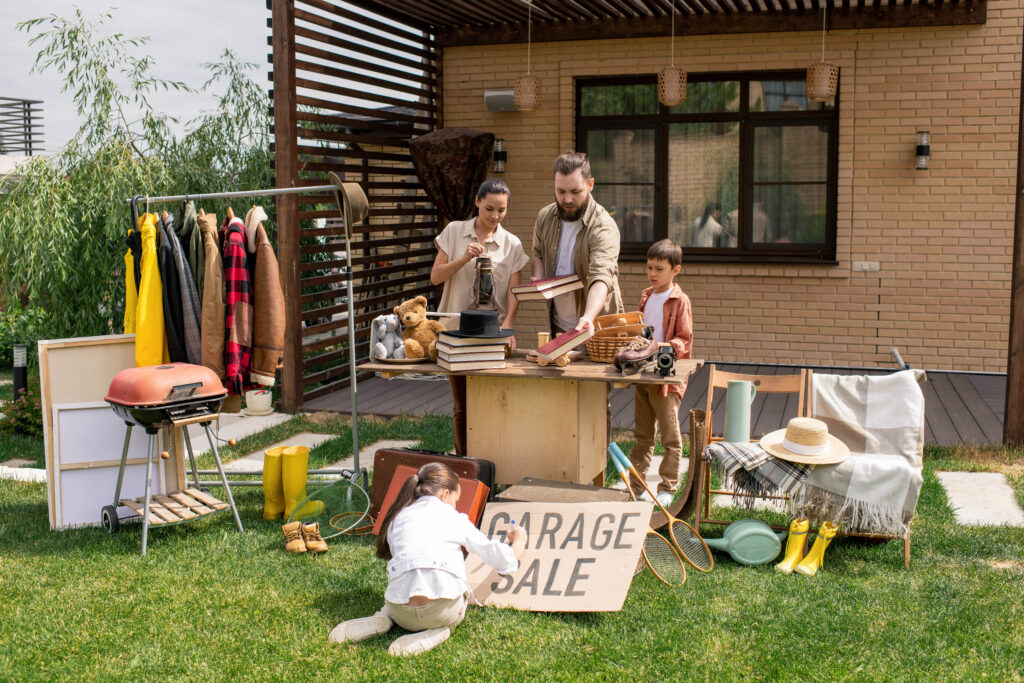If you are struggling with debt, you are probably well aware of how it can negatively impact every part of your life. In fact, the stress of dealing with debt regularly can cause physical problems including ulcers, headaches, an irregular heartbeat, and insomnia. If you want to slay the debt monster and eliminate the stress from your life, here are eight thrifty tips that can help you save money and get a fresh start.
1. Hold a garage sale
Gather up those items that are cluttering your house and hold a garage sale once or twice a year. This is a great opportunity to get rid of any unused or good-as-new items that may be doing nothing but taking up space. You set the prices as high as you would like, within reason. Don’t feel guilty about not donating the items to charity since you are still recycling them—while also earning money and decluttering.
2. Research before purchasing
Have you ever made an impulse purchase and regretted it later? If you spend just a few minutes researching big-ticket items, you can avoid buyer’s remorse. You will find real-time price comparisons on the Internet, which can save you more money than you might think. By doing this, you won’t waste time and money returning items by shipping them back to the manufacturer or going to the store.
Consumer Reports is a good source of information about products. There are also many online sites such as Bizrate.com and FindersCheapers.com.
3. Buy off-season
Be on the lookout for end-of-season items with deep discounts. For example, you might buy swimwear or patio furniture in the fall, Christmas items in late spring and skis in May. Some of these items can be marked down by as much as 60% or 70%. While you may have to wait a few months or even a year to use them, you may realize that you paid half of what other shoppers will when the time rolls around.
4. Stockpile your groceries
Look for super deals on those grocery items you regularly consume. When you buy them in large quantities, you will save money while also eliminating trips to the supermarket. Keep in mind that many big discount chains sell food items in bulk at very reasonable prices. It also pays to take advantage of special discounts like buy one, get one free on non-perishables if you won’t use it immediately.
A few examples of items you should stockpile include cleaning supplies, personal hygiene items, and dried foods like pasta, beans, and lentils. Be sure to keep track of expiration dates so your items don’t spoil before you have the chance to use them. Some perishables can have a long shelf life when stored in the freezer but try to always consume the older products first.
People Also Read
5. Clip coupons
Whenever you come across a coupon, think about it as found money. In other words, if you get a coupon that would save you $.50 on a bag of romaine lettuce, think of it as $.50 in your pocket. While it does take time and effort to search for useful coupons, these offers can add up to very serious savings over time.
However, you don’t have to use every coupon you come across. In fact, you may end up spending more than you are saving if you purchase items you don’t need or hardly use just to get the small discount.
6. Buy a used car
For many of us, there are few better feelings than driving a new car – complete with that new car smell. Plus, you get the manufacturer’s warranty and all the perks that come with purchasing it. But if you shop carefully, there is a good chance you will find a used one that could give you a lot more bang for your buck.
Industry experts report that the value of a new car can drop by approximately 20% during its first year of ownership. And over the next four years, it can begin losing about 15% of its value each year. Therefore, the value of your $40,000 brand-new car would have depreciated to $16,000 in just five years.
If you are smart, you will let the first owner endure this loss. Plus, you could always buy a two-year-old used car and still receive all the pricey options you wouldn’t have been able to afford had you bought it new.
7. Harness the power of online marketplaces
There’s a wide variety of online marketplaces, which typically have a large audience. They are a great place to unload those items in good shape that you no longer need or want. Listing your items may take some time if you are looking to provide quality descriptions and images in your post, but it is worth the effort when the reward could be earning big bucks.
Popular items include brand-name clothing, electronics, furnishings, decor, antiques, and collectibles. Much like a yard sale, you have the power to set prices. In many cases, buyers are responsible for covering shipping costs. But you usually have the option to offer “free shipping” by adding the shipping cost to the price of your item(s). This can help your item sell faster.
A few online marketplace options include Facebook Marketplace, Mercari, Poshmark, Bonanza, and OfferUp. They can also be your go-to shopping options if you are looking for big savings. While many items are second-hand, you would be surprised by the number of items in “new” condition with the price tags still attached.
8. Pay off your debt faster
If you are heavily in debt, you are most likely paying a large amount of interest each month. Another great way to practice thrift is to eliminate those interest payments by letting a company like National Debt Relief settle your debts. If you are eligible for debt relief and decide to enroll in our program, you may end up getting your debt resolved faster than making minimum monthly payments. Click here for a free estimate and more information.




